Cinema trash?

Cinema treasures.
Film Studies
professor’s class explores “trash cinema” and matters of taste
Pg.
6


College of Letters & Science INFOCUS May 2023, Vol. 13, No. 5
Contents
Feature Stories


CES alum’s “Tiny Zoo” teaches animal lessons
Global Studies alum debuts at MKE Film Fest
Film Studies prof finds treasure in trash films
Pol Sci alum launches careers as Avenica CEO
Ukrainian psych major finds success in tennis
U.S. State Dept wants to hire UWM students
Alumna’s ‘tiny zoo’ creepy creatures
What you need to know:
• Conservation and Environmental Science alumna Tatiana Gritsevskiy founded and runs “Tatiana’s Tiny Zoo.”
• Gritsevskiy collects small reptiles and amphibians and uses her animals to promote conservation through YouTube and community outreach.
Columns
Laurels and Accolades
Upcoming Eventss
Alumni Accomplishments
In the Media
People in Print
Published the first tuesday of each month by the college of letters and science at the university of Wisconsin-milWaukee
contact us at let-sci@uwm.edu
l&s acting dean: nigel rothfels
In Focus editor: deanna alba
Find us at uWMLetsci
Forget about the canary in the coal mine.
Reptiles and amphibians are excellent guides – indicator species – showing the initial impacts of long-term environmental change. That’s why it’s important for people to overcome the stigma often attached to these “creepy crawlies” and get to know them, said Tatiana Gritsevskiy, a UWM alumna who is working to educate people about the importance of reptiles, amphibians and insects in the world’s ecosystems.
Gritsevskiy earned her degree in conservation and environmental sciences in 2019 with a double minor in biology and geography. She has developed a business, Tatiana’s Tiny Zoo, to share her love of the creatures that some people find scary or icky and educate them on how to adopt and/or care for them.
“They’re misunderstood. Many people have negative attitudes toward them,” Gritsevskiy said. Her collection of pets includes tarantulas, millipedes, a ball python, a boa constrictor, a poison dart frog, a blue tongued skink, a few garter snakes and other reptiles, amphibians and insects.

2 • IN FOCUS • May, 2023
p.2 p.4 p.6 p.8 p.10 p.12 p.13 p.14 p.14 p.15 p.15
A blue tongued skink named Eponine is part of Gritsevskiy’s collection. (UWM Photo/Elora Hennessey)
zoo’ aims to quell fears about
Tatiana’s Tiny Zoo grew out of her interest in educating people about the roles these creatures play in the ecosystem. She goes out to classrooms, libraries, Scout meetings, pet stores, senior centers, birthday parties and anywhere else where there’s an interest in learning and enjoying some hands-on activities. She even took part in Milwaukee Comic Con, sharing her work as a volunteer for Reptile Rescue.
“I always loved animals and nature when I was growing up,” she said. In high school, she worked at a pet store in Mequon. When it came time for college, she originally thought she might enroll in a pre-veterinary program. However, after working in a vet clinic, she decided she wasn’t cut out to be a vet herself. That led her to UWM and the conservation program.
However, the pandemic affected opportunities in the field.
Popular YouTube channel
When she lost her job and was isolated from most of the rest of the world, she decided to set up an educational YouTube channel about the natural history, care and feeding of both the unusual critters she’d collected herself and others around the world. She’d started out as a film major at UWM, so the channel, which now has more than 3,000 followers, was a good fit with her skills. From there, the business of doing presentations took off two years ago. She also works at the Hawthorn Glen nature preserve, designing and presenting educational programs. Her personal zoo grew along with her interests.
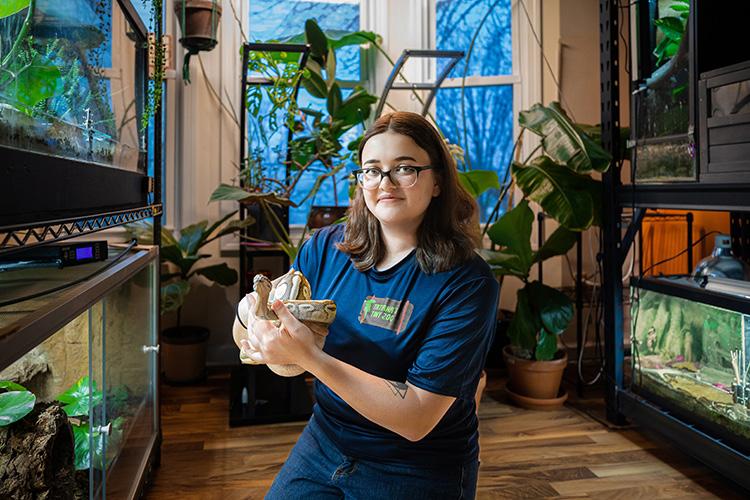
“I started out with a gecko, then another snake, and it just sort of spiraled from there.” Today, Gritsevskiy has 23 creatures, including a couple “regular” pets like a dog and an elderly ferret, which aren’t part of the zoo. She also has a very understanding landlord who doesn’t mind that her second bedroom is now the reptile room. Gritsevskiy said she is careful to follow all city and other regulations on the numbers and types of pets allowed.
If she does a presentation that’s interactive, she brings some of the creatures with her to share. For example, a ball python that she’s had for seven years since it was a baby is very “socialized,” she said, and enjoys being part of the show.
Clients enthusiastic
Clients are enthusiastic about the visits.
“We were so happy to welcome Tatiana and her Tiny Zoo to the Milwaukee Center for Independence,” said Erin Dentice, supervisor-life services at the organization. “Our clients thoroughly enjoyed getting to know the animals. Pet therapy positively impacts our clients’ energy levels, self-esteem, and mood.”
When Gritsevskiy was at UWM, she said, she was very shy about speaking up in class, but now her YouTube features and public presentations have helped her become much more outgoing and confident.
“It’s been a great experience running my own business.”
By Kathy Quirk, University Relations
3 College of Letters & Science • UW–Milwaukee •
creatures
Tatiana Gritsevskiy holds Dipper, a ball python, one of 23 creatures in her home menagerie. (UWM Photo/Elora Hennessey)
Global studies alumna makes her Milwaukee
“Earlybird” actress
What you need to know:
• Amanda Platt graduated from UWM in 2018 with a a major in Global Studies.
• Platt acted in the film “Earlybird” where she played a character named August.
• “Earlybird” debuted at the Milwaukee Film Festival in April and was also shown at the Independent Film Festival of Boston.
“Earlybird” is an independent comedy film that debuted at the Milwaukee Film Festival at the end of April. The movie tells the story of desperate theater owner trying to keep his business alive in the face of rent hikes and uninterested audiences. In a last-ditch attempt to keep his doors open, he gathers a rag-tag cast and crew and puts on increasingly outlandish plays.
If you caught the show, you might have been charmed by the character August – the shy theater manager who has been quietly holding the place together.

“She’s really hard working. She’s a shy character that doesn’t always speak up for herself or know how to advocate for herself. The theater is her entire life,” said Amanda Platt, who plays August in the film. “She lives and breathes it and puts her everything into keeping it alive.”
Platt has a lot in common with August: They’re both theater junkies. They’re both recovering wallflowers. And they both want to bring acting and art to the world at large.
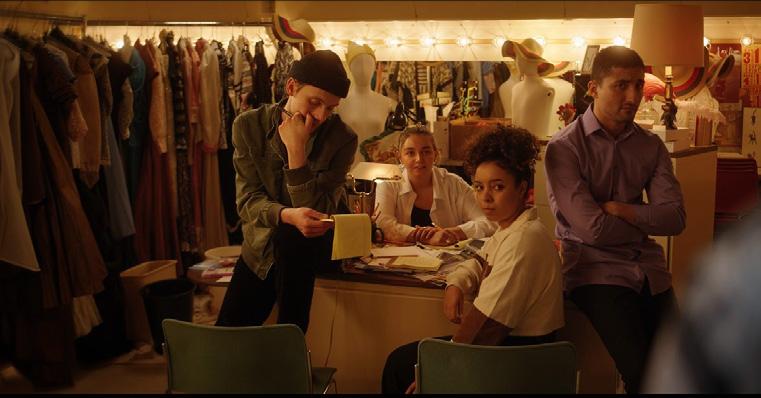
Platt, who is currently in graduate school at Marquette University, is a UWM alumna who graduated in 2018 with a major in global studies. The major was a perfect fit; Platt is a self-described Army brat who moved around the world with her American father and Italian mother. Eventually, she settled in Illinois where Platt fell in love with high school theater.
“I would be in the cast and the crew, and I liked being on both sides of the stage,” she said. “It’s cringey when I think back on it. I was a total theater nerd.”
But when it came time for college, Platt made sure to keep her theater hobby as just that – a hobby.
“I made a decision when I graduated high school that I wanted to preserve that love for acting. I didn’t want to pursue it as a career,” she said. “I knew
that for me, that would really take the fun out of it.”
So, she’s found different ways to keep her passion alive. While in school at UWM, she auditioned for and acted in several student films, and now that she’s in graduate school, she keeps an eye on casting calls on Facebook.
4 • IN FOCUS • May, 2023
UWM global studies alumna Amanda Platt acted in the film “Earlybird” which debuted at the Milwaukee Film Festival in April. Click the video above to view the “Earlybird” trailer or watch it on YouTube at https://youtu.be/ F5f0o7oLspg. Photo by Jolee Mallmann.
Milwaukee Film Festival debut as
That’s how she landed on the set of “Earlybird.” Platt saw a call for actors to star in a local film and sent in an audition tape. Three months later, she was cast in the role of August by “Earlybird” director Martin Kaszubowski. The film was shot locally in Milwaukee and Racine – a saving grace for Platt, who was in school while she was shooting.
“There was the challenge and triumph of being in the middle of my spring semester, a full-time student in graduate school with an assistantship and filming this film,” she said. “There were a lot of times where I was sitting in the dressing room, switching between working on my lines and working on class assignments and papers.”
In spite of that, Platt loved working with the talented cast and crew of “Earlybird.” The atmosphere was fun, friendly, and supportive, and the actors were talented and dedicated. Platt laughed as she recalled some of the unique challenges of filming: There is a running gag where her character, August, pops up unexpectedly to the consternation of the theater owner. Platt recounted having to crawl on the floor beneath the camera to get into position so she could jump into frame.
Seeing her work on the big screen was surreal, she said.
“It doesn’t feel real. The Milwaukee Film Festival definitely has high standards for the films that they take,” Platt said. “It feels like a big accomplishment to be accepted.” “Earlybird” was also accepted into the Independent Film Festival of Boston.
But now it’s back to classes for Platt. She is working toward her Master’s in Student Affairs of Higher Education in hopes of going into academic advising or student success programs, focusing on equity and access for underrepresented students. Ideally, she said, she’ll find a way to tie the arts into her work.
“I want to show other people that you don’t have to choose between a job and a passion. You can do both,” she said.
If you didn’t catch “Earlybird” at the Milwaukee Film Festival, don’t worry – Platt anticipates the film will be available for streaming after it completes the festival circuit.
By Sarah Vickery, College of Letters & Science
MKE Film Festival screens alums’ “Hundreds of Beavers”
A drunken applejack salesman of yesteryear must pit himself against furry monstrosities to become the greatest fur trapper in North America. He fights - you guessed it - hundreds of beavers.

This supernatural, silent comedy was produced by UWM alumni Sam Hogerton (‘09, BA Journalism, Advertising, and Media Studies and Digital Arts and Culture) and Kurt Ravenwood (Film). The film was screened at the Milwaukee Film Festival in April and will be shown once more on May 2.
The film has already garnerd praise from critics and has been shown in several festivals. Click the play button to view the trailer or visit https://youtu.be/ m39iu2YW-oM

The 5 College of Letters & Science • UW–Milwaukee •
Amanda Platt (‘18, BA Global Studies) smiles on the set of “Earlybird.” Photo by Jolee Mallmann.
Amanda Platt (‘18, BA Global Studies) works with the cast and crew on the set of “Earlybird.” Photo by Jolee Mallmann.
So bad, it’s good: Film Studies professor’s
What you need to know:
• Associate professor and director of Film Studies
Jocelyn Szczepaniak-Gillece teaches a class about “trash cinema.”
• Trash cinema includes low-budget, poorly made movies that are in bad taste and push boundaries.
• Nevertheless, trash cinema has important cultural and societal messages for viewers.
There are bad movies, really bad movies, and then there’s downright trash. But there are some treasures in those trashy films, and Jocelyn Szczepaniak-Gillece is helping her students find it.
Szczepaniak-Gillece, an associate professor and the director of the UWM Film Studies program, just wrapped up her class on “Trash Cinema,” which explores films that push the boundaries of good taste, revel in taboos, and embrace the gross side of life. Her work was recently featured on Wisconsin Public Radio
“All of the films that seem like just outrageous shockers actually have incredible historical meaning and political depth,” said Szczepaniak-Gillece. “They’re only trashy on the surface.”
Here are four things you need to know about trash cinema.
1. Trashy films are bad, but not all bad films are trash
There are plenty of bad movies out there, but not all of them are what Szczepaniak-Gillece would consider trash. A confusing script, poor chemistry between the actors, and other factors can bring down the quality of a film, but trash cinema goes beyond that.
“(It’s) movies that are on the fringes, that push against the boundaries of propriety, that may seem a little bit amoral –but tell us something about the world that we don’t usually expect movies to do,” Szczepaniak-Gillece said. “Trash is tasteless.”
Of course, taste is subjective, so it can be hard to separate trash from the merely bad. But there is a difference between a bad film like the 2019 version of “Cats” and a film like “Showgirls” (1995), which is often considered “trash canon.”
2. Trash films push boundaries, in distasteful and important ways.
Those boundaries include things like violence, gore, and sex. For instance, in the 1960s, a director named Herschell Gordon Lewis pioneered the “splatter” genre, films characterized by an absurd amount of violence and blood. Szczepaniak-Gillece points to his movie “Blood Feast,” a bizarre film about a caterer who murders women in an effort to resurrect an Egyptian goddess.
“He was not a good filmmaker, but (the movie) is filled with so much over-the-top gore and shock that it ended up being kind of successful,” Szczepaniak-Gillece laughed. But, said Szczepaniak-Gillece, because trashy films push boundaries, some films tackle taboo and important subjects in ways that a mainstream movie cannot or will not. In 1953, director Ed Wood created the film “Glen or Glenda,” a somewhat autobiographical feature that not only explored Wood’s fascination with cross-dressing, but also the life of famous trans actress Christine Jorgensen.
“You’re not going to get that in a Hollywood movie from 1953. You’re only going to find that in low-budget, outrageous shocker,” Szczepaniak-Gillece said. “Trash cinema, because it is on the fringes, has the ability to talk about social issues that are also on the fringes.”
3. Without trashy cinema, we wouldn’t have the cinematic treasures of today.
Trash cinema is often poorly made: A small budget, incoherent plot, and shoddy editing are all hallmarks of a trashy film. But though they appalled and titillated audiences, trashy films provided the groundwork for some of the most acclaimed films and directors today. For example, without Herschell Gordon Lewis, there would be no Quentin Tarantino.
The modern horror genre especially stands on the shoulders of trashy films of yesteryear, SzczepaniakGillece noted. So-called elevated horror, like “The Babadook” (2014) or “Hereditary” (2018), is of far better quality than its predecessors, but those films build off of tropes and structures that were introduced in low-budget, low-quality films.
“If you’re watching ‘Midsommar’ (2019), you don’t want to think that you would like Herschell Gordon Lewis. You’re too classy,” Szczepaniak-Gillece joked. “But ‘Midsommar’ draws on all of these tropes of older horror movies, especially horror movies on the fringes. You should think about that when you’re watching elevated horror. Are you actually a trashy film viewer?”
6 • IN FOCUS • May, 2023
professor’s class tackles “trash cinema”
“Bourdieu tells us that, depending on which class you find yourself fitting in, you will hate the class that is right above and below you,” she added. “If you’re middle-brow, you think trashy stuff is beneath you but that high-brow is pretentious.”
Ashley Hale, an English and film studies major who took the class, has learned that films of all “levels” have something of value to offer.
“I think there is also a misconception that art of low quality isn’t worth studying. It is,” Hale said. “ I think we gain a fuller picture of film history if we expose ourselves to all facets of it - not just the critically acclaimed films.”
Both she and her classmate, John Dewey, said they enjoyed the class, and both pointed to “Beyond the Valley of the Dolls” as their favorite film on the syllabus.
“As I watched these “trash” films, I realized how much I liked them and how much I learned from them,” Hale said.
“Trash cinema brings people together,” Dewey added. “Everyone’s got some trashy show or movie they enjoy, and there’s something really fun about getting together and sharing that experience.”
Jocelyn Szczepaniak-Gillece
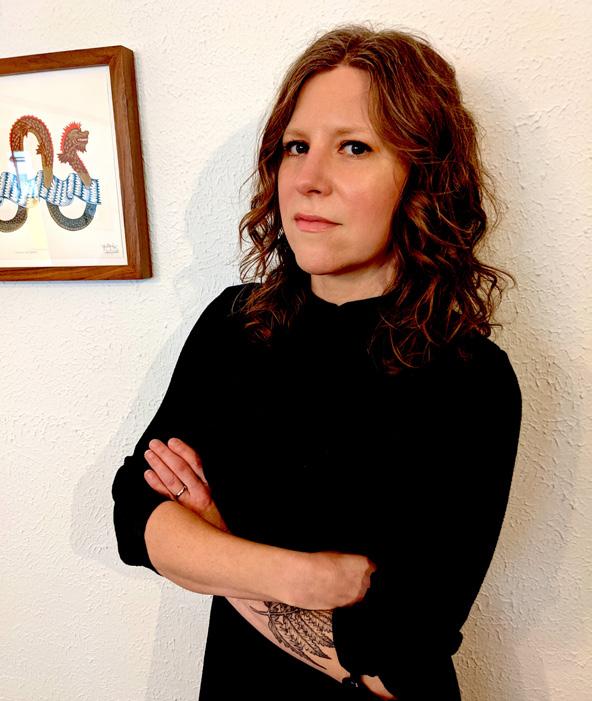
4. Taste is subjective – unless it’s not.
Some of the films that Szczepaniak-Gillece picked out for her class are hard to watch. She warns her students at the start of the course: If you’re a sensitive viewer, drop out now.
But she also wants her students to look beyond the surface of trash cinema. Why are these films so bad? What makes them in poor taste?
It’s because “taste is not natural,” Szczepaniak-Gillece said. Sure, we all have our preferences. But when it comes to good taste on a societal scale, “what you think you love is actually a product of your education, where you’re positioned in the social hierarchy, your class, and to a certain extent, your race and gender as well.”
She bases her explanation on the French sociologist Pierre Bourdieu, whose book is required reading for the course. Bourdieu notes there are three distinct “levels” of taste – the high-, middle-, and lowbrow. Highbrow cinema tends toward more artistic films, while middlebrow would feature films that appeal to broader audiences –think Oscar-bait or Marvel movies. Low-brow, of course, includes trash cinema and “all the stuff you’re not supposed to enjoy,” Szczepaniak-Gillece said.
So it’s okay to hate trashy cinema. It’s okay to love it. It’s okay to love to hate it. But Szczepaniak-Gillece hopes that her students – and audiences everywhere – understand that it’s more than a matter of taste. It’s a matter of class structure, social commentary, and the modern movies we love.
By Sarah Vickery, College of Letters & Science
Required viewing: The “Trash Cinema” syllabus
• Maniac (Dwain Esper, 1934)
• Glen or Glenda (Ed Wood, 1953)
• Blood Feast (Herschell Gordon Lewis, 1963)
• Beyond the Valley of the Dolls (Russ Meyer, 1970)
• The Trip (Roger Corman, 1967)
• Fascination (Jean Rollin, 1979)
• Who Can Kill a Child? (Narciso Ibáñez Serrador, 1976)
• Eraserhead (David Lynch, 1977)
• Polyester (John Waters, 1981)
• The Stuff (Larry Cohen, 1985)
• Showgirls (Paul Verhoeen, 1995)
• Death Proof (Quentin Tarantino, 2007)
• The Gleaners and I (Agnès Varda, 2000)
7 College of Letters & Science • UW–Milwaukee •
Matchmaker, matchmaker, find me a careers of new graduates
What you need to know:
• Scott Dettman (‘09, BA; ‘14, MA Political Science) is the CEO of Avenica, a career-matchmaking service that connects entry-level workers with hiring partners.
• Avenica hopes to change hiring practices by forgoing résumés in favor of matching candidates with jobs based on soft skills, personality, and cultural fit.
Graduation is quickly approaching, and while seniors are celebrating, they may also be asking an important question: What’s next?
Scott Dettman has some suggestions. Dettman, himself a UWM graduate who earned both his Bachelor’s and Master’s degrees from the university, is the CEO of Avenica Based in Minnesota, Avenica is a nationwide career matchmaking service, launching the careers of entry-level workers by rethinking the hiring process. The company is growing and Dettman hopes that his organization’s approach will make others rethink how they attract new talent.
Dettman sat down to talk about Avenica, the labor market, and what new graduates should keep in mind as they venture into the working world.
Tell me about your company. Avenica sounds like an interesting place to work.
We aim to unleash human potential through launching careers. For a long time, the labor market has been really demand-oriented. People have jobs that they need to fill and they will go search for people that are interested in those jobs.
We are trying to flip that and turn this into a supply side market.
We meet with new talent, and then we work to connect them with hiring partners that we have all over the country, because we have hundreds and hundreds of people looking for high-potential, early-career talent. We have launched thousands of careers by doing that. Last year, 62% of the careers we launched were for BIPOC (Black, indigenous, people of color) candidates. We’re still small, but we are starting to turn some heads.
Is this more of a personality match than a job skills match?
You have to have an understanding of where people are coming from if you’re going to be able to effectively communicate and work well as a team. You can find some of those individual quirks that make a team unique, but that are also pivotal to gluing that team together. We try to identify those things. That’s really what we’re matching.
We have some companies, some Fortune 500 companies, that don’t even interview the people that they are hiring from us. We guarantee that our candidate is going to be there, do a good job, and stick around for six months or we’ll give their money back. Job candidates don’t pay anything. Our hiring partners pay, but because we don’t have expensive recruiting systems, we can
charge a fraction of what most other companies do to launch talent. We’re eliminating barriers on both sides.
Do companies not already have access to talent just through people applying for jobs?
We’ve actually calculated that something like 80% of the available talent is never looked at, because of the way that job descriptions are currently written. Employers are only really seeing about 20% of the available talent. That’s like only brushing your teeth on Tuesday. That would be stupid, right? But, that’s how hiring is done today. The intention was to be more efficient, but the reality is that it’s actually commoditizing human potential.
We had a candidate who applied to work at a company on their own about five times, and never was given an interview. We launched that career for that individual at that company. That person has now been promoted twice in the last 18 months. That’s just one of dozens of case studies where companies are getting it wrong over and over. The secret behind every great company is great people. It always starts with people. And if you can’t figure that part out, you’re going to be at a competitive disadvantage.
You’ve seen a lot of success, but can one company really reshape the job market that much?
By 2030, we want to be launching 50,000 careers a year. That would be roughly 1.75% of the number of people that graduate from college each year. That’s still a small amount, but it’s also the amount of the auto market that Tesla currently owns. But there is now a Ford F150 pickup truck that is fully electric, right? You can see the impact Tesla has made.
8 • IN FOCUS • May, 2023
Pol Sci alum helps launch
You graduated with your Bachelor’s degree in 2009 in the middle of the Great Recession. You’ve got some personal experience with having a hard time finding a job after college.
I think I applied to something like 400 jobs, and I got one interview.
You went back to UWM for your Master’s degree and took PhD classes, worked at Manpower Group, and eventually came to your current position at Avenica. Did your UWM education help you on your way?
Scott Dettman

We’re hoping to eliminate the ideas of résumés from people’s minds and start thinking differently about human potential. Résumés are 540 years old. The first one was made by Leonardo da Vinci. He got a lot of stuff right, but the résumé wasn’t one of those things, and it’s time to move beyond it.
The future in my mind looks like having something that amounts to a digital key, if this makes sense. That key will give you a robust amount of data about who a job seeker is, what they care about, what other people say about them, and tell their full story. And then we can use that key to match them, through big data and algorithms, to the kinds of roles and environments where that person will thrive.
(How I finally got hired) is a funny story. I was invited for an interview for a marketing position with a consulting firm in the Greater Milwaukee area, and they did healthcare revenue. I wasn’t actually there to interview, apparently. I was actually brought in to meet with the CEO, mostly because he was going to explain to me why, with my degree in political science, there was no way I could do a job in marketing. I said, well, let me tell you why I think you’re wrong. I told him my story, spilled my guts to him. He paused and kind of sat back and said, Okay, I’m not going hire you for this job, but come back tomorrow for a better one. And he put me in charge of a division they were creating that was focused on healthcare and technology consulting.
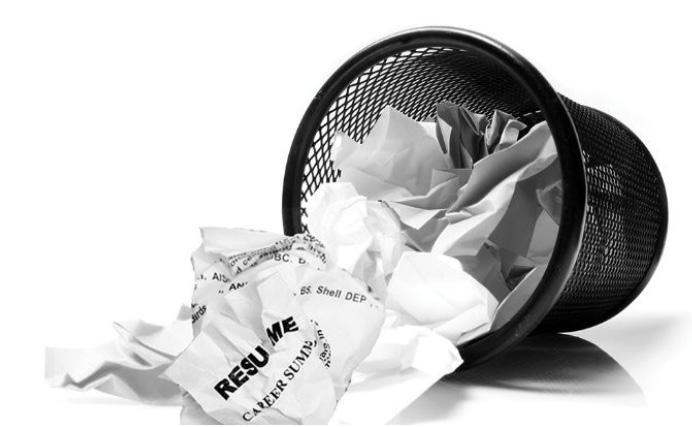
Political science, in a lot of ways, is the study of the interaction between people and institutions. So much of it bordered on economic theory as well. I did an executive-level management class through Harvard Business School, and you know, it was fine. But I feel like I learned more about how to run a company by studying political science than I did from the things I learned in business courses.
Our UWM seniors are about to graduate. What’s the labor market like for them? Do you have any advice?
My biggest suggestion would be to identify someone or something on the company’s platform that can help you tell your story. If you’re betting on just submitting your résumé, that doesn’t necessarily translate into success. If you’re studying something like liberal arts, you’re really training to be a thinker, leader. Those are those are roles that are harder to come by early in your career. You want to be thinking about the types of roles that feed into those other kinds of roles. What are the paths you can take to get you to where you want to go where you can really exercise those muscles?
By Sarah Vickery, College of Letters & Science
9 College of Letters & Science • UW–Milwaukee • a job:
Scott Dettman says he would like to do away with résumés altogether.
From Ukraine to UWM, tennis player
What you need to know:
• Nadiia Konieva fled her hometown of Kharkiv, Ukraine, after the Russian invasion and eventually made her way to the United States.
• Konieva was recruited to the UWM tennis team and has had a strong spring season.

• She is a psychology major and hopes to become a clinical psychologist working with victims of trauma.
A week after the Russians invaded Ukraine, 16-year-old Nadiia Konieva set off on a journey that led her to the women’s tennis team at UWM.
Konieva and her mother, Iryna, fled to Poland from their home in Kharkiv, leaving behind her father, Serhii, other family and all of her friends. Kharkiv, Ukraine’s second largest city, lies just 25 miles from the Russian border.
Her tennis coach and the father of some youngsters she’d worked with arranged for a bus to take a group to Poland and included her and her mother. The journey took four days because of all the traffic jams and shelling, Konieva recalled.
She had been planning to come to the United States eventually, Konieva said, hoping to earn a scholarship to go to school and play tennis.
However, the outbreak of war accelerated her plans. In Ukraine at the time, school was for only 11 years, making her a year younger than the average incoming college student in the U.S. (School has since changed to 12 years in Ukraine.)
Konieva took charge of her own future.
“We don’t have a lot of money in Ukraine, and it was very hard because no one knows me, so I tried to do it by myself.”

One big problem was that she had to leave almost everything behind in Ukraine, including her tennis equipment. However, her host family in Poland and a local sports club came to the rescue, helping her gather needed equipment. “So, I was able to keep practicing.”
Around the same time, a friend posted an Instagram story about an agency that would help Ukrainian young people get to the U.S. “I decided to try it and texted them.”
The agency helped her with all the visa documents and grade transcripts and put her in contact with three U.S. colleges. At the same time, UWM women’s tennis coach Ryan Kucera was
Konieva has put together a solid record as a freshman this season, playing both singles and doubles. (Len Cederholm/for Milwaukee Athletics)
recruiting for the team. Konieva, now 17, came to UWM.
“It was pretty hard, but I was admitted and arrived here Aug. 29.”
She has had a strong spring season, playing both doubles and singles. In early March, she and her doubles partner, Giorgia Cavestro, were named the Horizon League women’s doubles team of the week. It was a career first for both athletes.
Kucera has been impressed with Konieva’s accomplishments both on and off the court.
“The thing I was blown away with about Nadiia originally and still holds true today is that she’s got such great spirit.”
Konieva is extremely coachable and has improved through the year, he added.
“She’s one of those kids…you tell her to do something, and she does it at 100%. The results are showing up both on the court and in the classroom. She shows up every day with a smile on her face and supports her teammates. She’s inspiring.”
At UWM, Konieva is majoring in psychology, hoping to become a clinical psychologist and work with families or teens who have had trauma in their lives.
She had studied some English in Ukraine but improved her fluency while living in Poland.
“Poland was a very good experience for me because I actually don’t know Polish, so I needed to speak English. It was really good practice for me.”
10 • IN FOCUS • May, 2023
player finds a new life
Teachers supportive
She has found her teachers at UWM very supportive, Konieva said.
“I really like the teachers here because the teachers always say I can come for help any time. There is free tutoring so I can go and get help every single day if I need it.”
During the winter break, she worked part-time in housing to try to ease the financial burden on her mother, who is still in Poland. Right now, with schoolwork, practice and competition, she isn’t able to continue as a student worker.
Her teammates and other students have been welcoming and offer to help. Unlike the experience of some other Ukrainian athletes, she hasn’t

found any negative reactions from Russians she has met.
Other students and teammates who know her background have been empathetic.
“A lot of people try to express that they want to help if they can.” The one thing they can’t help with, though, “is stopping wars,” Konieva said.
Worried about family, friends
Konieva plans to stay in the United States and complete her doctorate, a requirement in the field of clinical psychology.
She follows what is happening in Ukraine on the news. “When the war started, my mom was always
checking the news. I tried to be kind of separate from it because it was super hard. I tried not to look at it.”
Now she stays in touch with what is happening through her family, coaches and friends who have scattered to Britain, Germany and Poland.
“I hope we can all get together this summer, but who knows what will happen?”
By Kathy Quirk, University Relations
11 College of Letters & Science • UW–Milwaukee •
Nadiia Konieva has taken a long journey from escaping the war in Ukraine to Poland and then to Milwaukee, where she’s a freshman psychology student and tennis player. (Milwaukee Athletics photo)
U.S. State Department wants new hires to reflect America’s diversity - starting with UWM

The U.S. Department of State is hiring, and Susan Falatko hopes that some of its new employees will come from UWM.
Falatko is the State Department’s Diplomat in Residence for the Midwest. In April, she visited UWM students as part of a recruiting tour. The State Department is looking to grow its ranks, both of foreign officers who are stationed in U.S. embassies overseas, and of civil officers, who manage the Department’s bureaus in Washington, D.C.
“We’re looking for people with a broad knowledge and understanding of the world,” Falatko said before her meeting with students. “We actually hire all majors, and we can hire right out of undergrad. We’re looking for qualities that are indicative of success in the foreign service.”
Those qualities include things like cultural adaptability, good judgment, resourcefulness, initiative, and an ability to think on one’s feet. Prospective hires can gain those qualities anywhere, Falatko noted. She’s noticed that many people think that studying abroad is a requirement for a successful application, but even things like volunteer work, starting a club, or getting involved in student research can help students build those traits.
People hoping to enter the State Department must first take the Foreign Service Officer Test, and may choose one of five career tracks (consular, economic, management, political, or public diplomacy). These are considered “generalist” careers, and are available to applicants from all majors. The State Department provides the training needed.

The State Department also offers more specialized careers requiring different knowledge sets – some that people may not think of when they think about the State Department.
For instance, the Department is looking for IT managers, systems administrators, and software engineers to oversee its computer and data systems. It hires engineers to build and upgrade its embassy facilities and health care providers to take care of its personnel overseas.
Falatko, who majored in psychology as an undergraduate, said the Department is particularly looking for people with a background in STEM fields at the moment, both for policy and applied science careers.
As the State Department recruits, Falatko also wants to ensure that its new employees represent their country. That means recruiting people of different ethnic backgrounds, genders, neurodiversity, disabilities, socioeconomic backgrounds, and even geographic locations.
“I don’t think people in the Midwest tend to think of these roles typically, or they don’t think it’s for them. That was certainly the case for me,” Falatko said.
She grew up in the Midwest and has held posts as an economic officer in Bosnia and Herzegovina, Cuba, Mali; as a public diplomacy officer in Rwanda; and as the Deputy Chief of Mission (Deputy Ambassador) in Mauritius and Slovenia.
Working at the State Department has been an amazing experience, she said, and she hopes that UWM students will also want to serve their country.
“Serve your country; see the world. We are working for the American people,” she said. “What we’re doing out there is all about serving Americans back home and making sure they are safe, secure, and prosperous.”
Students interested in learning more about careers with the State Department can visit the Department’s website, or contact Falatko directly at DIRMidwest@state.gov. The State Department also is looking for interns. Internships are paid, can be served overseas or in Washington, D.C., and include housing and transportation.
“The State Department is looking for highly motivated, intellectually curious students with great communication skills, who can accurately integrate and analyze information and are culturally adaptable” said political science senior teacher facuty member Kristin Trenholm after Falatko’s visit. “UWM offers a variety of foreign language, business, and social science programs that are well-suited for State Department careers.”
Falatko also sat on a panel discussing careers in government alongside Koreen Grube, a UWM alumna and Director at U.S. Commercial Service, and David Abundis, a regional recruiter for the Peace Corps
By Sarah Vickery, College of Letters & Science
12 • IN FOCUS • May, 2023
Laurels and Accolades

Brenda Cárdenas’ (English) book Trace: Poems was published by Red Hen Press on April 18. Cardenas will launch Trace at Woodland Pattern Book Center (720 E. Locus St., Milwaukee) at 7 p.m on May 6 alongside her former doctoral advisee, Beatrice Szymkowski, who will launch her own book B/RDS (University of Utah Press). The launch will also be livestreamed. In addition, Cardenas’ “Poema Para Los Tin-Tun-Teros” / “Poem for the Tin-Tun-Teros” from her book Boomerang has been set to choral music by Daniel Afonso (California State University, Stanislaus), and the sheet music (including poem) has been accepted for publication by Hal Leonard, the largest music publisher and distributer of school music in the U.S. It was also accepted to be part of a series of choral works curated by Dr. Eugene Rogers (University of Michigan), a well-known American choral conductor.
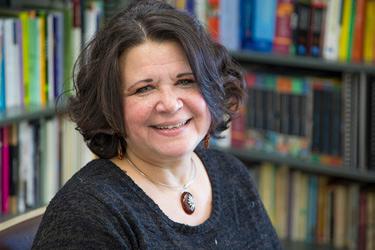
Caroline Seymour-Jorn (Global Studies) and Miren Boehm (Philosophy) received UW System Fellowships from the Institute for Research in the Humanities for 2023-2024. Caroline will work on her new book, Arab Literary Selves in the Global Arena
Winson Chu (History) will participate in the inaugural Summer Institute for Scholars of East Central and Southeastern Europe (SISECSE) hosted by the American Council of Learned Societies (ACLS) and the Centre for Advanced Study Sofia (CAS). Chu is one of fourteen scholars from Eastern Europe and North America who will convene for a two-week residency from June 1-15, 2023, at the American University in Bulgaria in Blagoevgrad.
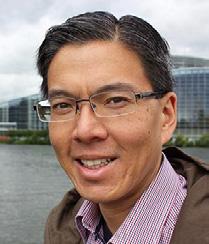
PhD student Mohammed Adjieteh (Mathematical Sciences) has attained the designation of Associate of the Society of Actuaries (SOA). To attain the designation, a candidate must pass numerous professional exams and e-learning courses, and must complete several educational experiences outside the SOA education system and a professionalism seminar.
Liam Callanan’s (English) most recent book, When in Rome, was recommended by the Oprah Daily website as part of its spring reading list. Callanan’s novel follows Claire, a middleaged woman searching for a change in life. She grapples with both religion and love on a trip to a convent in Rome.
Principal Investigators Karyn Frick (Psychology) and Nigel Rothfels (Office of Undergraduate Research - OUR), and Co-Investigators Caitlin Bowman (Psychology), Kyla Esguerra (OUR), Tamara McKinney (OUR), and Gabriela Nagy (Psychology) were awarded a $2M National Institute of Aging MSTEM program award. Their program, “The UWMilwaukee Promoting Equity, Diversity, and Academic Success Through Aging Research Program (UWM STAR),” is designed to reduce health disparities in older adults by getting underrepresented students involved in hands-on aging and health disparities research and providing opportunities that encourage them to pursue advanced degrees in medicine, science, technology, engineering, and math.

WUWM Radio, which operates under the umbrella of the College of Letters & Science, was recently recognized with a number of awards from the Midwest Broadcast Journalists Association, including First Place for Lake Effect in the Talk/Public Affairs Category, and five Awards of Merit for their work and reporting in Talk/Public Affairs, Social Media, Soft Feature, Sports Reporting, and Team Multimedia Storytelling - News for their 2022 Voter Guide.
Additionally, WUWM’s 2023 Spring Election coverage garnered six segments on national NPR shows and web properties, including Morning Edition (Lina Tran and Chuck Quirmbach), Here and Now (Chuck Quirmbach), and The Takeaway (Maayan Silver).
13 College of Letters & Science • UW–Milwaukee •
Brenda Cárdenas
Winson Chu
Karyn Frick
Upcoming Events
Recurring May events
Negotiating Authenticity: Reproducing the Past for the Present and Open Parameters – late nineteenth and early twentieth century’s Chinese calligraphy and painting. Emile H. Mathis Art Gallery. Explore how reproductions connect us to the past. Exhibits run Monday-Thursday, 10 a.m.-4 p.m. through May 11.
May 3
Cultures & Communities and Ethnic Studies Open House. 11 a.m.-2 p.m. Bolton 195. Drop ins welcome; a brief program begins at noon.
May 4

The French Table. 1-2 p.m. Curtin 766. Practice French conversational skills. All levels welcome. Occurs many Wednesdays and Thursdays. Check our online calendar.

Careers in Counseling – A panel discussion. 2:30-3:30 p.m. Lubar N126. Learn about careers in counseling and human services. Attend in person or virtually
May 5
Urban Studies Programs’ 25th Annual Student Research Forum. 12-5:30 p.m. Union Fireside Lounge. Keynote speaker is Claire Dunning (University of Maryland, College Park). See a full schedule of events.

The Tragedy of Heterosexuality in Global Context: A Lecture by Jane Ward. 3-4:30 p.m. Lubar Entrepreneurship Center. Jane Ward, UC Santa Barbara, critiques arguments about heterosexuality and queerness. Part of the Women’s & Gender Studies Feminist Lecture Series
May 10
Il Circolo Italiano – Bocce Ball. 4:30-5:30 p.m. Curtin lawn. No knowledge of Italian is required.
Alumni Accomplishments

Jen Pokorski (‘97, BS Biological Sciences and Conservation and Environmental Science) was selected as the new county manager of Maricopa County in Arizona. Pokorski is currently the assistant county manager. Maricopa is the fourth-largest county in the United States.
Atiera Coleman (‘16, PhD Sociology) will speak at Beloit College’s 173rd Commencement in May. Coleman is also a graduate of Beloit College and now works as the Rock County Equity Manager, where she works to ensure equitable access to county services.
Alexander Rassogianis’ (‘82, MA History) memoir, Growing Up Greek in Chicago, was reviewed in the the National Herald and lauded as both “moving” and “amusing.” Rassogianis has also penned three novels and is working on a short story collection.
Zhanna Slor (‘08, BA English) published her second novel, Breakfall, in April. The book follows a divorced mother who finds herself involved in a murder mystery. The Shepherd Express penned a write-up and explored the premise and process of the book.
People in Print
Bernard Arulanandam, Hamid Beladi, and Avik Chakrabarti
Michael J. Mikos (Ancient and Modern Languages, Literatures, Esther Chan (Sociology), Isaiah Jeong, and Elijah Jeong. 2023. Blindness,Color-Cognizance, and Race in Christian Organizations.
14 • IN FOCUS • May, 2023
May 2023 Sun Mon Tue Wed Thu Fri Sat 1 2 3 4 5 6 7 8 9 10 11 12 13 14 15 16 17 18 19 20 21 22 23 24 25 26 27 28 29 30 31
In the Media and Around the Community

Heather O’Brien (‘05, MS Biological Sciences) presented “Wyoming Wolverines” as part of the Wyoming Game and Fish Department’s Werner Wildlife Study Series.
Maria Novotny (English) asked WPR’s WHYsconsin to explore how educators teach curriculum about Wisconsin tribes and Indigenous people in the state. The published article shared some of the pedagogical approaches teachers use when introducing K-12 students to Native American history in Wisconsin.
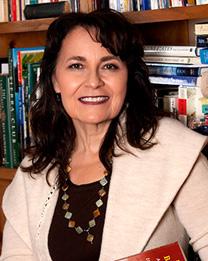
An art installation of poetry at the Wisconsin Center was set to be decommissioned, but outcry from the Center’s board and people like Kimberly Blaeser (emerita English), who helped curate the installation in the 1990s, paused its removal, WUWM Radio reported. The Milwaukee Journal Sentinel also covered the story.
Itziar Lazkano (Economics) explained to Fox 6 News how the Inflation Reduction Act might benefit manufacturers like Foxconn.
It would take 50 billion years for the Earth to tidally lock with the moon, Jean Creighton (Planetarium) told Live Science. She also spoke to WUWM Radio about the astronomy and mythology of constellations you can see in spring.
Shale Horowitz (Political Science) discussed reactions to Israeli foreign policy in an article he penned for the Middle East Forum that was reprinted on JewishPress. com
Jennifer Jordan (Sociology) was a guest on the All About Beer Podcast in April, where she discussed her current research into now-defunct regions where hops were grown.
The prehistoric Tully Monster may look nothing like modern fish, but Victoria McCoy (Geosciences) was quoted by the Scientific American saying that the fossil of the creature shows similarities to today’s lampreys or hagfish.
Janet Protaseiwicz’s victory in April’s race for a seat on the Wisconsin Supreme Court shows that abortion is still an issue that mobilizes Democratic voters, Kathy Dolan (Political Science) said in The New York Times. An oped published on WisPolitics.com quoted Dolan from the New York Times article.
Minnesota Public Radio listed a talk by Erin Winkler (African and African Diaspora Studies) as a resource for teaching children about race and racism.
Can seaweed become a long-term food source? More research is needed, Filipe Alberto (Biological Sciences) said in an article published by Hakai Magazine.
The Milwaukee Journal Sentinel reported that, once again, Carvd N Stone founder Nyesha Stone (‘18, Journalism, Advertising, and Media Studies) will be offering the Loren Martin Hintz Travel Writing Scholarship to a Milwaukee student.
The Milwaukee Journal Sentinel highlighted several film festival taking place in the city in April, including the Italian Film Festival USA and the Latin American Film Series, each hosted or sponsored by departments in the College of Letters & Science.
TikTok does have access to its users’ data, but Marc Tasman (Journalism, Advertising, and Media Studies) said that we should be concerned about all social media apps after calls surfaced to ban the popular video app. CBS 58 News reported the story.
Chakrabarti (Economics). 2023. Obesity and COVID-19 Mortality are Correlated. Scientific Reports, Nature, 13(1). Literatures, & Cultures) (translator). 2023. Jan Kochanowski, Occasional Poems. Bloomington, IN: Slavica Publishers, 2023. 2023. Racial and Religious Convergences and Divergences among Christian Students’Approaches to ColorOrganizations. Journal for the Scientfic Study of Religion, 62(1):164–183.
15 College of Letters & Science • UW–Milwaukee •
Thank you for your generosity!
On April 14, otherwise known as 414 Day in Milwaukee, UWM Panthers came together to support the university’s mission of access, education, and inclusion. UWM Giving Day 2023 raised more than $1 million for the university, thanks to generous donors from across the schools and colleges.

We in the College of Letters & Science are especially grateful for the support of our alumni, faculty, staff, students, and community partners. With your help, the College of Letters & Science raised $42,604 from 160 donors. We especially want to recognize:
• The Department of Economics: Donors unlocked the Department’s challenge gift of $1,000 from Professor John Heywood. All donations will directly help students in the economics program.

• The Department of Sociology: The Department exceeded its 414 Day goal of 10 new donors supporting sociology students.
If you want to show your support for the College of Letters & Science or any of its departments or programs, you can still donate! Visit give.uwm.edu to designate where your donation should go. Your support means so much to us. We’re Panther Proud of everyone who contributed this year!





































